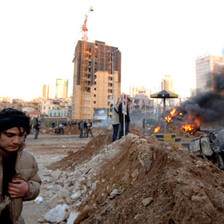Electronic Lebanon 17 April 2007

Lebanon: a nice place to visit but not to live? Youth enjoy Al-Rawshe Mediterranean beach in Beirut, August 2006. (Payam Borazjani/MaanImages)
In a time of political upheaval and economic crisis following the July-August 2006 Israeli war on Lebanon, we constantly think of the young Lebanese who have lost hope in their mother country, resorting to what they believe is their only solution: deserting Lebanon. It would be foolish to pretend we cannot understand, as we also feel disheartened and find ourselves temporarily drawn to the thesis of a chaotic Lebanon struck by brain drain. A thesis promoted by analysts who consider emigration to be a handicap, a vicious cycle which undermines the fragile social and demographic equilibriums of Lebanon. This exact thesis is also articulated by Lebanese religious authorities (mainly Christian ones) who have been trying for years to hinder new waves of emigration.
A vision of emigration as a national hemorrhage and a menace to the country is reinforced by multiple studies and surveys carried out during the past couple of years in Lebanon. One survey conducted by Ipsos, a Middle East research institute, revealed that 50 percent of those questioned do not foresee a professional future in Lebanon. Subjects of this particular study were Lebanese between 20 and 40 affected by a trend of “collective despair”.
Another survey conducted by l’Observatoire universitaire de la realite socio-economique (OURSE), at Saint-Joseph University in Beirut revealed that one graduate out of five (between 2002 and 2004) resides overseas, i.e. 21.5 percent of the graduates from the university. A January 2007 edition of the Lebanese weekly publication Magazine considers this statistic to be “alarming”, entailing disastrous and dangerous consequences for the future of the nation.
An article by writer Rania Massoud, published prior to the July-August 2006 war in the newspaper L’Orient-le-Jour, suggests that Lebanon has been, in recent years, a “theater” of emigration, mainly towards Canada and the United States.
Massoud’s article outlines that the current economic crisis drives youth to leave the country in search of a stable life; most migrants deciding to remain in the country of immigration, visiting Lebanon from time to time to spend vacations.
In another article by Alistair Lyon published by Reuters in January 2007, “Losing hope, Lebanese seek future abroad”, highlights the despair of Lebanese youth: “the scale of the hemorrhage is hard to pin down”. Lyon’s statement is based on a survey conducted by the Lebanese Emigration Research Center. According to the Center, 60 percent of those surveyed (600 residents from two different groups — students or recent graduates and middle-aged people) want to leave, mostly due to a crisis of employment, or because they do not envision their future — or their children’s — in Lebanon.
In the weekly Lebanese Magazine (5 January 2007), it is stated that the figures “speak” on their own (i.e. no interpretation is necessary). Well, permit us to declare that these figures do “speak”, yet according to certain interests and particular beliefs.
Statistics are never 100 percent reliable. They are partial and their interpretation remains biased to a certain degree. For instance, the statistics conducted by OURSE at Saint-Joseph University do not include data from other Lebanese universities; they are only based on one. Furthermore, according to OURSE, the main reasons for emigration are “education” at 59.3 percent and “employment” at 34 percent. The results of the survey were interpreted in such a way to reveal an economic and political crisis. If we look even further into the issue, we would be more inclined to address factors related to the movement of human resources and to the globalization of knowledge, its transmission and exchange. Despite the facts presented, the causes of emigration are numerous. Even if we believe emigration is a constant in the history of Lebanon and the Lebanese, as if it belongs to a national nature and genetic code, it is both a positive and a negative constant cause of suffering and joy. Consequently, it should not be considered a menace or a curse: why forget about the wealth emanating from the diverse contributions (financial, cultural, socio-political, etc.) of the Lebanese emigrants to the development of their country of origin? According to the World Bank, the monetary transfers of the emigrants to Lebanon amounted to $5.6 billion in 2006, while the total exports from Lebanon amounted to $4.2 billion.
It is certain that a form of despair inhabits new generations of Lebanese, but this is far from being generalized to all youth and from now on, we shouldn’t only specify the negative aspects of emigration (for example: the fact that a few thousand Lebanese have dual nationality is considered “frightening” according to certain analysts in Magazine, 5 January 2007). In addition, we shouldn’t only speak of an “inner fear” (“la peur viscerale”), a “deaf anger” (“la colere sourde”) and “the uncertainty” (“l’incertitude”) that push the Lebanese “to leave their homeland behind”.
What about the numerous initiatives from members of Lebanese civil society and the Diaspora through which Lebanese youth play a significant role? Having mentioned this point, we also want to highlight the contributions of freelance journalists, artists, film makers, directors, bloggers as well as groups and associations such as Nahwa al-Muwatiniya, Samidoun, Amam 05, Nahnou, Youth in Action, Resolve it Solve it, Solida, Tadamon! Montreal, Helem, Libanus, etc.
Even if such contributions still lack exposure, financial means and support from a large number of individuals, they constitute a significant form of resistance from a youth that is not entirely driven by traditional political parties or drowned in despair.
Moreover, we rarely speak of the young Lebanese who actually returned to Lebanon during the past couple of years or of those who consider heading back home. In a meeting-debate between a group of 20 to 40-year-old individuals at the University of Montreal (Chaire de recherche du Canada en Islam, Pluralisme et Globalisation) in October 2006 — which revolved around war and its impacts at the individual and collective level — four out of ten participants were calmly optimistic, yet realistic. One was willing to immediately go back to Lebanon, ready to face the diverse obstacles she might have to face. The remaining six were pessimistic — convinced they will never return to the fold, at least in the short run. If the number of emigrants returning to Lebanon appears to be minor, it constitutes, without doubt, a reality that we shouldn’t disregard in our analysis of migratory phenomena. Having stated this it should be clear that, Lebanese youth are not uniform or monolithic. Diverse and dynamic in time and space, the migratory movements of Lebanese youth are plural (mandatory, personal choice, temporary, permanent, etc.), and the accompanying identities and memories are even more diverse. We have repeated the latter on several occasions to journalists who interviewed us after the July-August 2006 war (Reuters, Radio Publique Allemande, Radio Canada, etc.).
Unfortunately, the “sensational aspect” of the drama and the suffering is often given much more media coverage than the initiatives of peace and social justice. The misinformation and propaganda of most of the traditional local and international media constitutes an obstacle to be urgently overcome. Not to mention other obvious obstacles such as the incompetence and deficiency of the current Lebanese government and those which preceded it, mainly in matters concerning the integration of young graduates into the labor market and the development of a global plan to encourage emigrants to return home or at least to invest in Lebanon.
Instead of concentrating on and complaining about the despair of the Lebanese youth and the curse of emigration, one should support the organizing efforts which are ongoing focusing on addressing the socio-political and economic crisis in Lebanon, and encourage more the initiatives within the Lebanese Diaspora. After all, the emigrants constitute, indisputably, a main pillar in the reconstruction of Lebanon.
Pamela Chrabieh, PhD., is a researcher at the University of Montreal and the St-Joseph University of Beirut, blogger (http://pchrabieh.blogspot.com), author, iconographer and activist in several organizations in Beirut and Montreal.
Michele Chrabieh works in the Human Resources field in Beirut, and is a creative writer. She was deeply engaged in humanitarian campaigns and anti-war events throughout the July-August 2006 war on Lebanon.
Related Links

